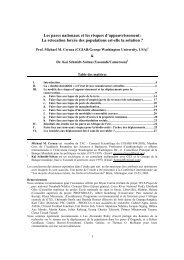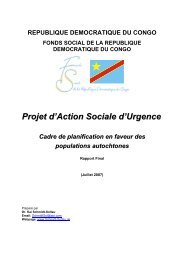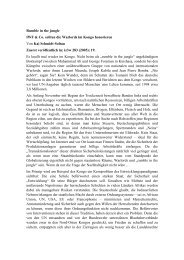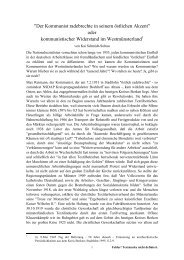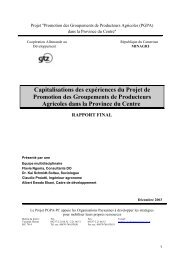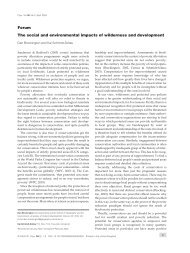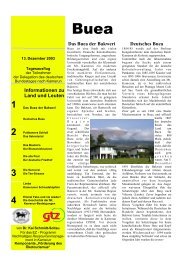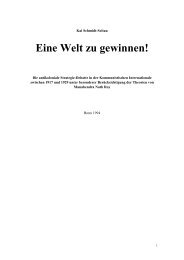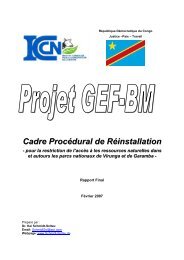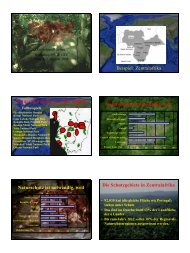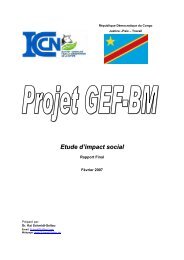GTZ & IP_San Jose_final - Dr. Kai Schmidt-Soltau
GTZ & IP_San Jose_final - Dr. Kai Schmidt-Soltau
GTZ & IP_San Jose_final - Dr. Kai Schmidt-Soltau
You also want an ePaper? Increase the reach of your titles
YUMPU automatically turns print PDFs into web optimized ePapers that Google loves.
Proposed process<br />
Proposed definition of indigenous people<br />
• Property and user rights (often non-formal) and/or<br />
close attachment to and dependence (social/<br />
economic) on land and natural resources<br />
• self-identification as members of a distinct cultural<br />
group (culture, language, social and political<br />
institutions)<br />
• Marginalization in the legal, social, political and<br />
economic domain<br />
• Question 1:<br />
• It has been suggested that <strong>IP</strong>s and local<br />
communities should be - following the logic of the<br />
CBD - addressed in one policy? Do you agree or<br />
would you recommend a specific policy for<br />
indigenous people?<br />
Proposed elements of the policy<br />
1. Why does <strong>GTZ</strong> strive to cooperate with <strong>IP</strong> even<br />
more than with other populations?<br />
Poverty reduction, good governance, CBD, CCD<br />
2. Who is addressed in this policy?<br />
Definition of indigenous people see above<br />
3. What is the German aim in this cooperation?<br />
Assist <strong>IP</strong> in getting, defending and using their rights<br />
4. What is the mandate of this policy?<br />
Binding for <strong>GTZ</strong> and all projects receiving <strong>GTZ</strong><br />
support; guideline for German private sector<br />
Proposed elements of the policy<br />
5. What is the guiding principle of this cooperation?<br />
Well and prior informed consent on all interventions,<br />
which might have an impact on <strong>IP</strong>, their<br />
rights, livelihoods etc.<br />
6. Which methods and instruments will be put in place<br />
to achieve this?<br />
Social Assessment & Indigenous People<br />
Development Plan.<br />
7. Which support/assistance is provided by <strong>GTZ</strong>?<br />
see proposed areas of assistance<br />
8. How does this cooperation address conflicting<br />
cultural issues?<br />
I don’t know. Any idea??<br />
Proposed elements of the policy<br />
9. How does <strong>GTZ</strong> address the issues of traditional<br />
knowledge, access and benefit sharing?<br />
I hope to get an idea on this topic during the<br />
conference.<br />
10. How does <strong>GTZ</strong> guarantee the quality of its<br />
performance?<br />
Publication of all documents, regular fora for<br />
discussion and mutual learning, funds and<br />
capacity building for <strong>IP</strong>-organizations to<br />
supervise activities.<br />
11. Which structures will be put in place to achieve<br />
accountability?<br />
Inspection panel?<br />
Possible areas of specific assistance<br />
1. Legal advice, lobbying<br />
2. Technical assistance on land tenure issues,<br />
restitution, benefit sharing<br />
3. Land use mapping, demarcation of territories<br />
4. Capacity building in „modern“ natural resource<br />
management/ translation of indigenous practices<br />
and land use knowledge into „modern“ concepts =<br />
management plans, business plans (access and<br />
benefit sharing)<br />
5. Dual education<br />
6. Organizational development at community level



